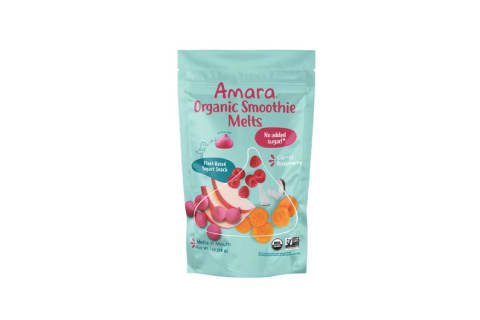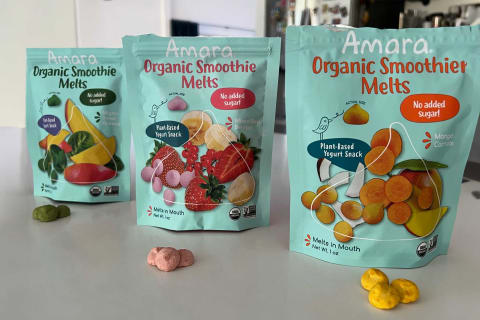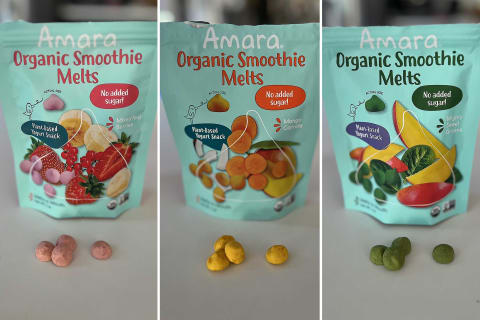Advertisement
Amara's Organic Smoothie Melts Have 5-Star Ingredients — But Let's See If Toddlers Approve


I have 10 nieces and three nephews, so I’m no stranger to picky eaters. And if there’s one thing I’ve learned, it’s that when you find a healthy food your child will eat, you should order it in bulk.
Unfortunately, many healthy snacks miss the mark on taste, and those that do taste good tend to have a laundry list of not-so-great ingredients. Amara’s Organic Smoothie Melts are made with simple, clean ingredients (real foods you can actually pronounce!)—and our tiny testers couldn’t get enough.
Below, learn everything you need to know about the Amara Smoothie Melts and how they compare to Happy Baby Yogi's. Plus, find out what a registered dietitian says about both—along with a toddler taste-test of both brands.
What is Amara?
The blunt truth? Many conventional baby foods use repeated high-heat processing that strips nutrients, texture, and flavor from the foods. Meaning: Even if the ingredient list sounds good, your child might not actually be getting any of those important nutrients (and it likely won’t taste so great either).
Enter: Amara, a baby food brand that’s committed to providing food that looks, tastes, and smells like the homemade versions that your favorite mom influencers are somehow finding time to make.
The brand works with a team of nutritionists, food scientists, and chefs to develop each recipe for optimal taste and nutrition, and then uses a unique process to lock in taste, texture, and color. Each product is packaged in a convenient packet that’s perfect to take on the go.
Summary: Amara’s products hit the mark on all the things parents care about most: nutritional value, safety of ingredients, taste, and convenience.
What products does Amara have?
Amara’s website is conveniently organized by age, with the option to shop for children 5 to 7 months, 8 to 10 months, 11 to 12 months, or 12 to 36 months. You can also sort by product type: baby food, toddler food, or variety packs.
Amara’s baby food comes in single-serve packets, and you can customize each meal for your baby by adding either water, breast milk, or formula to reach your desired texture. The flavors are unique (think Oats n’ Berries, Applesauce with Maqui Berry, Kale Potato Veggie Mash, and more) and packed with nutrient-dense ingredients.
While Amara's entire lineup is worthy of a callout, our review focuses on the Organic Smoothie Melts, which come in five flavors: Mixed Red Berries, Mango Carrots, Carrot Raspberry, Mighty Sweet Greens, and Beets n’ Berries.
What's in the Amara Smoothie Melts?
Shall we start by addressing what’s not in these mouthwatering morsels? Like all Amara products, the melts are made with no binding agents and no added sugars.
Instead, the brand uses simple, whole ingredients such as organic bananas, organic berries, and organic coconut milk. And yes, every product is certified organic and GMO-free.
All ingredients are sourced individually and directly from manufacturers, and the brand prides itself on producing primarily from within the U.S. (but some ingredients do come from America or Europe).
Each ingredient is picked at peak harvest to ensure the foods are as nutrient-dense and flavorful as possible.
The smoothie melts are gluten-free, dairy-free, and tree nut-free (but many do contain coconut!).
How much do the Amara Smoothie Melts cost?
Those parent priorities I mentioned earlier? We know cost is high on that list as well.
Amara’s smoothie melts can be purchased in packs of 6, 12, 18, or 24, and each pack has four servings. Your most cost-effective option is to buy the larger packs.
See blow for a full cost breakdown:
- 6-pack: $40 ($6.66 per pack; $1.67 per serving)
- 12-pack: $68 ($5.66 per pack; $1.42 per serving)
- 18-pack: $98 ($5.44 per pack; $1.36 per serving)
- 24-pack: $130 ($5.41 per pack; $1.34 per serving)
Your kids will fly through these packs, so you’ll definitely want to have more on hand! Bonus: You’ll save an additional 15% if you sign up for a subscription, which can be delivered every 14 or 30 days and skipped at any time.
Our experience testing the Amara Organic Smoothie Melts
Once we vetted the ingredients, it was time for the real test: approval from the kids.
We enlisted two toddlers to try the Amara Smoothie Melts. Both children eat solids, but they have very different eating habits.
Our older tester was described as an “extremely picky” eater. “Getting her to eat veggies is very challenging,” says Tracy Rosecrans, mindbodygreen president and mother of both testers.
As these things tend to go, Rosecrans says the younger tester is exactly the opposite and generally likes everything.
The verdict? Both kids loved the melts, and Rosecrans found them pretty tasty herself. Overall, she was impressed with the clean, organic ingredient profile and liked that they are easy to grab and go.
Rosecrans adds that she will continue to buy the melts in the future, and the Red Berries flavor was the toddlers’ favorite (which they showed by demolishing half the bag in one sitting).
Another bonus: The melts are shelf-stable, meaning you do not need to put them in the refrigerator for storage!
What we'd change about the melts
Truly, there’s nothing we would change about the taste, texture, packaging, or ingredients of the Amara Smoothie Melts—but we do wish there was a bit more of the product in each bag, especially considering the rate our testers ate them at!
While the cost could be a deterrent for some, you’re paying for better, healthier ingredients and a snack your child will actually enjoy.
What a registered dietitian says
No matter how clean an ingredient profile looks to me, I always like to run it by mindbodygreen’s registered dietitian, Molly Knudsen, M.S., RDN.
Knudsen was equally impressed by Amara’s simple ingredients, highlighting that the melts are made from just organic fruits, vegetables, and coconut milk. She notes that, because there are no added sugars, “Any carbohydrates you see on the label are naturally occurring from the fruits, veggies, and coconut milk.”
“The melts are also allergen friendly for kiddos who have a milk allergy or don't tolerate lactose well,” Knudsen says, adding that they’d make great on-the-go snacks or to serve with a meal.
Amara Smoothie Melts vs. Happy Baby Yogis
It wouldn’t be a true review if our testers had nothing to compare these melts to, so we also had them sample Happy Baby Yogis, a popular freeze dried yogurt and fruit snack.
When comparing the taste of these two brands, the kids enjoyed the Yogis and Amara Smoothie Melts equally. Both were devoured pretty quickly, and the packaging is equally convenient and portable.
That in mind, Amara’s melts came out on top when we factored in the ingredient list and Knudsen’s comparison.
As mentioned, Amara’s ingredient lists are short and sweet, only containing foods you’d eat on their own. And while both brands are certified organic and GMO-free, Happy Baby's ingredient list is much longer, with add-ins such as organic tapioca starch, pectin, concentrates, inulin, and tocopherols.
Happy Baby also contains added sugar, while Amara does not. When you consider the fact that over 80% of children are eating too much sugar1 (and the health damages it causes1), there's truly no reason to opt for the added-sugar option—especially since Amara's melts taste just as good!
Another key differentiator is that the Happy Baby Yogis are milk-based, while Amara’s melts are dairy-free. Knudsen flagged this in her review of the two brands as well, noting that Amara is a better choice for kids with dairy allergies or sensitivities.
These factors are enough to make us opt for Amara.
The takeaway
Finding snacks that are both parent- and toddler-approved can be a struggle, to say the least. The Amara Organic Smoothie Melts are made with real, clean, whole ingredients—and our testers literally ate them up. When compared with Happy Baby's similar Yogi snacks, Amara's melts are a better-for-you option that tastes just as great.
Finally, a snack you can feel good about.





